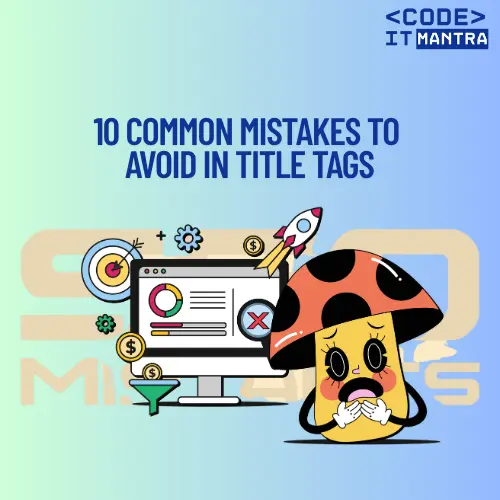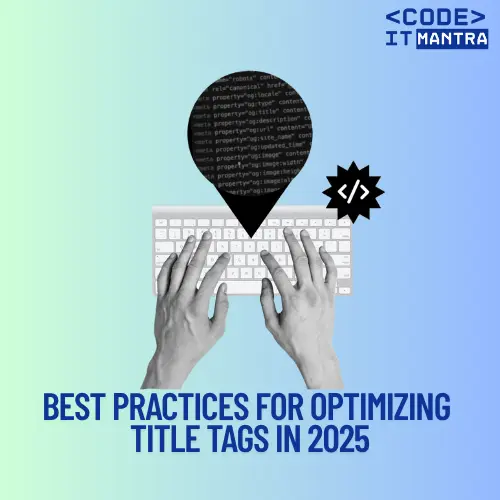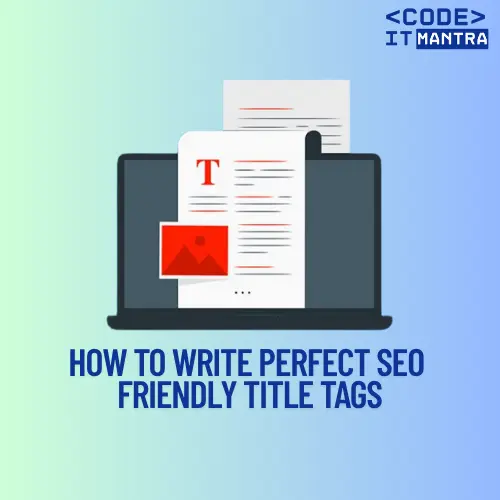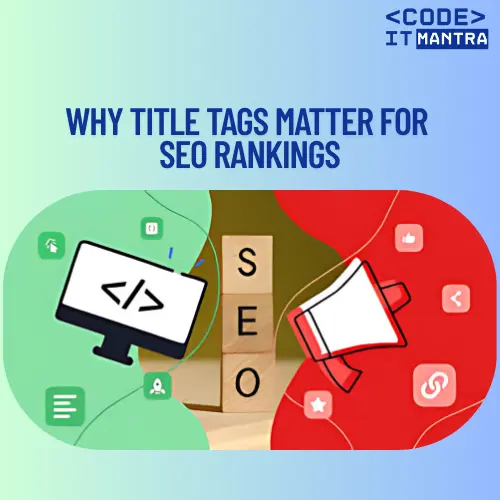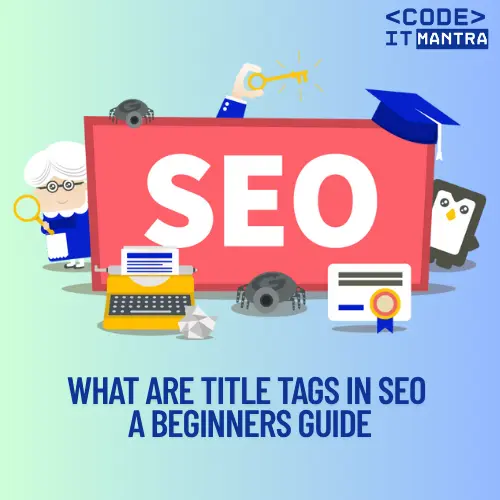10 Common Mistakes to Avoid in Title Tags
Table of Contents
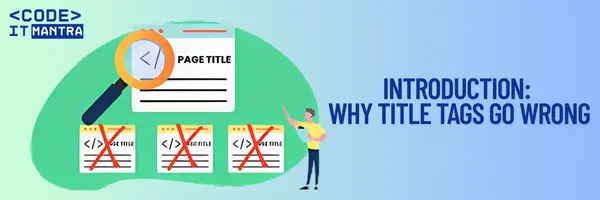
Introduction: Why Title Tags Go Wrong
Title tags are a key part of SEO but many websites do not use them properly. When title tags go wrong it can harm search engine rankings & reduce the number of visitors to your site. Understanding the common mistakes with title tags can help you avoid them & improve your website performance in search results.
1. Using Duplicate Title Tags
One common mistake is using the same title tag on multiple pages. This confuses search engines because they cannot tell which page is more relevant for a search query. Duplicate titles also make it harder for users to differentiate pages. Each page should have a unique title tag that clearly describes its content to avoid this problem.
2. Writing Titles That Are Too Long
Another issue is making title tags too long. Search engines typically display only 50 to 60 characters of a title. If your title is longer it will be cut off which can look unprofessional & confuse users. Keep your titles concise & focused so the important parts are visible & easy to understand in search results.
3. Ignoring Keywords in Title Tags
Some websites do not include relevant keywords in their title tags. Keywords help search engines know what your page is about & match it to user searches. Ignoring keywords means missing out on ranking opportunities. This is important to include your main keyword naturally near the beginning of the title to boost SEO & relevance.
4. Keyword Stuffing in Titles
Then some websites overuse keywords in title tags a practice called keyword stuffing. This looks spammy to search engines & can lead to penalties or lower rankings. A title like "Buy Shoes Buy Shoes Cheap Shoes" is not helpful. Instead write clear natural titles that include keywords without repeating them unnecessarily.
5. Using Vague or Generic Titles
Titles such as "Home" "Welcome" or "Page 1" are vague & do not tell users or search engines what the page contains. Such generic titles reduce your site chance to rank well & fail to attract clicks. Every title tag should be descriptive & specific helping users quickly understand the page purpose before clicking.
6. Forgetting to Update Title Tags
Sometimes websites leave outdated title tags after changing page content or redesigning the site. This causes a mismatch between the title & the actual page content confusing visitors & search engines. Regularly reviewing & updating your title tags ensures they remain accurate & relevant which improves SEO & user trust.
7. Examples of Wrong & Right Title Tags
Here is an example of a wrong title tag: "Page 2." It tells nothing about the page. A better version would be "Easy Vegan Dinner Recipes for Beginners | Healthy Eats." This title is clear includes keywords & strengthen clicks. Always aim to create titles that are helpful & appealing to users & search engines alike.
<title>Page 2</title> < -- Wrong example -->
<title>Easy Vegan Dinner Recipes for Beginners | Healthy Eats</title> < -- Correct example -->
8. How to Fix Common Title Tag Problems
To fix title tag issues start by auditing your website for duplicate or vague titles. Use SEO tools like Google Search Console or Yoast SEO to identify problems. Rewrite titles to include important keywords naturally & keep them concise. Always make sure every page has a unique descriptive & user-friendly title tag that matches the page content.
- Check for duplicates & make each title unique.
- Include relevant keywords without overusing them.
- Keep titles under 60 characters for better display.
- Update titles regularly to match page changes.
Conclusion
Title tags often go wrong because of simple mistakes that can be fixed with attention & care. Using unique clear & keyword-rich titles improves search rankings & attracts more visitors. Avoid duplication keyword stuffing & vague wording to ensure your title tags help your website grow. Properly managing title tags is a small step that leads to big SEO results.

Mistake 1: Keyword Stuffing
Keyword stuffing is one of the most common SEO mistakes that many website owners make. It happens when a webpage uses the same keyword or phrase too many times in an unnatural way. This practice was once popular to try & rank higher on search engines but now it can actually harm your SEO & make your site look spammy to both users & search engines.
What is Keyword Stuffing?
Keyword stuffing means repeating the same keywords too often in your content titles or meta tags. This can make the text hard to read & unnatural. For example if a website about shoes uses "best running shoes" excessively like "best running shoes are the best running shoes for best running shoes buyers" this is keyword stuffing. Search engines dislike this & may penalize the website.
Why Keyword Stuffing is Harmful
-
Search engines like Google want to show useful & natural content to users. Keyword stuffing makes content look forced & low quality. Because of this Google can lower your rankings or even remove your page from search results.
-
Keyword stuffing creates a poor user experience. Visitors find it difficult & annoying to read repetitive content. This increases the chance that users will leave your site quickly raising your bounce rate which is bad for SEO.
-
Overusing keywords can confuse search engines about what your page is really about. Instead of helping it can reduce your visibility for relevant searches & hurt your website authority.
How to Avoid Keyword Stuffing
-
Write naturally for your readers not just for search engines. Focus on clear & helpful content that uses keywords only where they fit smoothly in the text.
-
Use synonyms & related terms instead of repeating the same keyword. For example instead of "best running shoes" many times use "top jogging footwear" or "comfortable sports shoes."
-
Check keyword density. Keep keywords at a reasonable percentage usually around 1 to 2 percent of the total words to avoid overuse.
Example of Keyword Stuffing vs. Good Use
Here is an example showing the difference. Keyword stuffing example: Best running shoes are the best running shoes for people looking for the best running shoes that are best running shoes on the market. This is hard to read & spammy.
Good example: Finding the best running shoes can be challenging. Many top brands offer comfortable & durable options for all types of runners. This sounds natural & uses related words without repeating the same phrase.
Solutions to Fix Keyword Stuffing
-
Review your website content carefully & remove repeated keywords that do not fit naturally. Rewrite sentences to sound more fluid & helpful.
-
Use SEO tools like Yoast or SEMrush to analyze keyword usage & get suggestions on improving your content quality.
-
Focus on creating content that answers user questions or solves problems instead of just focusing on keywords. This approach improves SEO & user satisfaction.
Conclusion
Keyword stuffing is a serious SEO mistake that can hurt your website ranking & reputation. To succeed in SEO write naturally use keywords thoughtfully & focus on quality content that serves your audience. Avoid keyword stuffing to keep your website user-friendly & search engine friendly at the same time.

Mistake 2: Duplicate or Generic Titles
One common SEO mistake many website owners make is using duplicate or generic titles on multiple pages. Duplicate titles mean that different pages have the exact same title tag. Generic titles are quite broad & do not clearly describe the page content. Both can harm your website search rankings & user experience. Understanding why this happens & how to fix this is important for better SEO performance & attracting the right visitors.
Why Duplicate Titles Are a Problem
When Google finds many pages with the same title tag it becomes difficult for the search engine to understand which page is most relevant for a user search. Duplicate titles confuse search engines which can lead to lower rankings for all those pages. Also users may find your search listings unclear causing fewer clicks. For example if five blog posts all use the title Latest News Google will not know which one to prioritize.
How Generic Titles Hurt Your SEO
Generic titles like "Home" "Services" or "Welcome" do not give any meaningful information about the page content. This makes it harder for search engines & users to understand what the page is about. If your title tags are too broad your pages may not rank well for specific search queries. For example a generic title like Products is less helpful than Organic Skincare Products for Sensitive Skin.
Solutions to Fix Duplicate or Generic Titles
The best way to solve this issue is to create unique descriptive titles for every page on your website. Each title should clearly reflect the content of that specific page. Use relevant keywords naturally & make the titles engaging for users. For example instead of using "Blog Post" use How to Grow Tomatoes at Home - Gardening Tips. This helps both Google & users understand the page better.
Tips to Write Unique Titles for Every Page
First include the main keyword for the page topic to improve search visibility. Next add specific details that differentiate the page from others on your site. You can also add your brand name at the end for recognition. For example Affordable Web Design Services in New York - WebPro is clear keyword-rich & unique. Avoid repeating titles even if pages cover related topics.
Using Tools to Identify Duplicate Titles
Many SEO tools can help you find duplicate or generic titles on your website. Tools like Google Search Console Screaming Frog or SEMrush scan your site & show which pages have duplicate titles. Once identified you can update those titles with unique & descriptive text. Regularly auditing your titles ensures better SEO health & prevents ranking issues caused by duplicates.
Example of Correct Title Tag Usage
<title>Top 10 Budget Travel Tips for Europe - TravelGuide</title>
This title tag is unique includes relevant keywords like "budget travel tips" & "Europe" & ends with a brand name. It clearly tells both search engines & users what the page is about. Such titles improve your chances of ranking higher & getting more clicks compared to generic or duplicate titles.
Summary of Key Points
- Duplicate titles confuse search engines & lower rankings because Google cannot decide which page to show.
- Generic titles are too broad & do not help users or search engines understand the page content.
- Create unique & descriptive titles for every page that include relevant keywords naturally.
- Add specific details & your brand name to make titles clear & recognizable.
- Use SEO tools like Google Search Console or Screaming Frog to find & fix duplicate titles.
- Regularly update & audit your titles to maintain good SEO health & better rankings.
Fixing duplicate & generic title mistakes is a simple but powerful step to improve your website SEO. Clear unique titles help search engines understand your content & attract the right visitors to your site. Focus on writing descriptive & specific titles that match each page purpose for the best results.

Mistake 3: Missing Keywords or Relevance
One of the most common mistakes in SEO & content creation is missing keywords or failing to keep the title & content relevant. Keywords are the words or phrases people type into search engines when looking for information. If your page does not include the right keywords it will be hard for users to find your content. Missing keywords means losing valuable visitors & traffic.
Relevance is just as important. Even if you include keywords if your title or content does not match what users expect they will quickly leave your site. This can hurt your website reputation & search rankings. Making sure keywords & relevance are balanced is essential for SEO success & user satisfaction.
1. Why Keywords Matter in Titles & Content
Keywords help search engines understand what your page is about. When a user searches for those keywords the search engine decides whether to show your page based on how well your content matches. For example if your page is about "homemade pizza recipes" but you never use that phrase or similar terms your page will not rank well for that topic.
Solution: Research keywords related to your topic using free tools like Google Keyword Planner or Ubersuggest. Include these keywords naturally in your title headings & throughout the content. This improves your chances of appearing in relevant search results.
2. The Problem of Irrelevant Titles or Content
Even if you include keywords your title or page must be relevant to what users expect. If your title promises one thing but the content talks about something else users will leave quickly. This increases bounce rates & signals to search engines that your page is not helpful.
Solution: Always ensure your title & content closely match the keywords you target. Write clear titles that honestly describe the page. For example if your title is "Easy Cake Recipes" the content should focus on simple cake recipes & not on unrelated desserts.
3. Avoid Keyword Stuffing & Maintain Natural Flow
Some people make the mistake of overusing keywords to try to rank higher. This is called keyword stuffing & makes content hard to read. Search engines also penalize this practice which can hurt your rankings. Instead of adding many keywords unnaturally focus on writing clearly & naturally.
Solution: Use keywords thoughtfully & in relevant places. For example place the main keyword in the title tag & once or twice in the content but avoid repeating it too much. Always prioritize natural & easy-to-read language.
4. Use Related Keywords & Synonyms for Better Coverage
Relying on only one keyword may limit your page reach. Users might search using different phrases with similar meanings. Using related keywords & synonyms helps your page appear for a wider range of searches. For example if your main keyword is "car repair" related terms could be "auto maintenance" "vehicle fixing" or "car service."
Solution: Include relevant synonyms & related keywords naturally in your content. This approach improves relevance & increases the chance of ranking for more search terms without keyword stuffing.
Code Example: Using Keywords Properly
<title>Simple Homemade Pizza Recipes for Beginners</title>
<h2>Easy Pizza Dough & Topping Ideas</h2>
<p>If you love cooking these homemade pizza recipes will help you create delicious meals at home. Our recipes focus on simple ingredients & easy steps to make pizza quickly.</p>
This example uses the main keyword "homemade pizza recipes" in the title & content. It also includes related phrases like "easy pizza dough" & "simple ingredients" naturally improving relevance.
Summary: Avoid Missing Keywords or Relevance Mistakes
- Include important keywords: Research & add relevant keywords to titles & content to help search engines find your page.
- Keep content relevant: Make sure the title & content match what users expect based on the keywords.
- Avoid keyword stuffing: Use keywords naturally & sparingly to keep content easy to read & SEO-friendly.
- Use related keywords: Include synonyms & similar phrases to reach a broader audience & improve search rankings.
By avoiding the mistake of missing keywords or lacking relevance you improve your website visibility & user experience. Proper use of keywords & relevant content helps attract the right visitors keeps them engaged & builds your website authority over time.

Other Common Title Tag Errors (4–10)
Title tags are quite important for SEO & user experience. While many people know basic mistakes like missing or duplicate title tags there are several other common errors that can harm your website ranking & click rates. In this article we will discuss title tag errors numbered 4 to 10 explain why they happen & show examples & solutions to fix them. Understanding these errors will help you create better more effective title tags.
4. Using Generic Titles Without Specific Keywords
Many websites make the mistake of using quite generic title tags like "Home" "Welcome" or "Products." These titles are too broad & do not tell search engines or users what the page is about. For example a page selling leather bags with the title "Products" will not rank well. A better title would be "High-Quality Leather Bags – Stylish & Durable." Adding specific keywords helps the page rank for relevant searches & attracts interested visitors.
5. Ignoring Title Tag Length Limits
Google usually displays only the first 50-60 characters of a title tag. If your title is too long it gets cut off & looks incomplete. For example a title like "Buy Affordable & Comfortable Running Shoes for Men & Women Online at Best Prices" is too long & will be trimmed in search results. To fix this keep your titles concise & clear like "Affordable Running Shoes for Men & Women." This improves readability & click rates.
6. Using Duplicate Title Tags Across Multiple Pages
Duplicate title tags are common when websites use the same title for different pages. For example a blog with multiple articles titled "Tips for Healthy Living" will confuse search engines. Each page should have a unique title that clearly describes its content such as "Tips for Healthy Living – Exercise & Diet" & "Tips for Healthy Living – Mental Wellness." Unique titles help search engines understand your content better & improve SEO.
7. Keyword Stuffing in Title Tags
Some website owners try to include too many keywords in a title tag hoping to rank higher. For example "Buy Cheap Laptops Best Laptops Affordable Laptops Online" looks spammy & can hurt SEO. Keyword stuffing makes the title hard to read & lowers trust. Instead write natural titles like "Affordable Laptops for Sale – Best Quality & Price." Use keywords wisely without overdoing it to keep the title user-friendly & effective.
8. Missing Brand Name or Using It Improperly
Including your brand name in the title tag is important but placing it incorrectly can reduce impact. Putting the brand name at the beginning of the title can hide important keywords. For example "YourBrand – Buy Running Shoes Online" is less effective than "Buy Running Shoes Online – YourBrand." Usually placing the brand at the end of the title helps stress main keywords first & still builds brand awareness.
9. Not Matching Title Tag with Page Content
A common error is writing a title tag that does not match the actual page content. For example if the title says "Healthy Vegan Recipes" but the page shows meat-based dishes users will get confused & leave quickly. This hurts SEO because search engines track user behavior. Make sure your title accurately reflects the page content to keep visitors engaged & improve rankings.
10. Forgetting to Update Title Tags Regularly
Many websites write title tags once & forget to update them. Over time content changes trends evolve & new keywords become important. For example an article titled "Best Smartphones 2020" will become outdated. Regularly reviewing & updating your title tags keeps your site relevant. You can change it to "Best Smartphones 2025 – Top Models & Reviews" to attract current searches & maintain good SEO.
Summary of Title Tag Errors 4 to 10
- Generic titles: Use specific keywords to describe each page clearly.
- Too long titles: Keep titles within 50-60 characters for better display.
- Duplicate titles: Create unique titles for every page.
- Keyword stuffing: Avoid overloading titles with keywords; keep it natural.
- Brand name placement: Place your brand at the end for better SEO impact.
- Mismatch with content: Ensure title tags reflect the actual page content.
- Not updating titles: Regularly review & improve titles as needed.
By avoiding these common title tag errors you can improve your website SEO & give a better experience for visitors. Focus on clear concise & relevant titles that match your content & use keywords smartly. Regular updates & good practices will help your website rank higher & attract more clicks over time.

Fixing Title Tag Mistakes for Better SEO
Title tags are one of the most important parts of search engine optimization (SEO). They help search engines understand what your webpage is about & impact how many people click on your link in search results. But many websites make mistakes in their title tags that hurt their SEO performance. In this article we will explain common title tag mistakes & how to fix them for better SEO results.
Why Fixing Title Tag Mistakes Matters
Incorrect or poorly written title tags can reduce your website visibility on search engines. This means fewer visitors & less traffic. Fixing title tag mistakes helps search engines better understand your content & makes your pages more attractive to users. With improved titles your pages can rank higher & get more clicks.
Common Title Tag Mistakes & How to Fix Them
- Using Duplicate Title Tags: Many websites use the same title tag for multiple pages. This confuses search engines because they cannot tell the difference between pages. To fix this create unique title tags for each page that accurately describe their content. For example instead of using
<title>Home</title>on every page use<title>Home Cleaning Services in Chicago</title>for the home page &<title>Window Cleaning Services in Chicago</title>for the window cleaning page. - Title Tags Too Long or Too Short: Title tags should be neither too long nor too short. If they are too long search engines cut off the extra words which may reduce clarity. If too short they might not describe the page well. The best practice is to keep titles between 50 & 60 characters. Use tools like Google Search Console to check how your titles appear in search results.
- Keyword Stuffing: Some people add too many keywords to title tags hoping to rank for many searches. This practice looks unnatural & can harm SEO. Instead use one or two main keywords that best describe the page topic. Write titles that read naturally & make sense to users.
- Not Including Important Keywords: Sometimes title tags do not contain the main keywords people use to search. This lowers the chances of ranking well. To fix this research keywords related to your content & include the most relevant ones near the beginning of the title.
- Ignoring Branding: Not adding your brand name in the title tags can miss an opportunity to increase brand awareness. Adding your brand at the end of the title helps users recognize your website primary if your brand is popular. For example:
<title>Affordable SEO Services - YourBrandName</title>.
Example of Fixing a Poor Title Tag
Suppose the original title tag is:
<title>Home</title>
This title is too short vague & not helpful for SEO. To fix it you can change it to:
<title>Professional Home Cleaning Services in New York | CleanCo</title>
This fixed title is clear includes important keywords mentions the location & adds the brand name. It improves both SEO & user attraction.
How to Check Your Title Tags
- Use Google Search Console: This free tool shows how your pages perform in search including click-through rates & impressions. You can find pages with low CTR & check if their titles need improvement.
- SEO Audit Tools: Tools like SEMrush or Ahrefs scan your website & report duplicate or missing title tags & suggest improvements.
- Manual Checks: Visit your website right-click & select "View Page Source" to see the title tag in the
<head>section. Check if this is unique & descriptive for that page.
Best Practices to Keep Title Tags Optimized
- Write Unique Titles for Every Page: This helps search engines understand your content better & prevents competition between your own pages.
- Include Relevant Keywords Naturally: Keywords should fit naturally in the title without forcing them. This improves both SEO & user readability.
- Limit Length to 50-60 Characters: This ensures the full title shows in search results & keeps it concise.
- Use Branding Wisely: Add your brand at the end of titles for better recognition primary for home pages or important landing pages.
Conclusion
Fixing title tag mistakes is an easy yet powerful way to improve your website SEO. Avoid duplicate titles keep the length right use keywords properly & include your brand name where possible. By following these tips & regularly checking your title tags you can increase your website visibility & attract more visitors from search engines.



